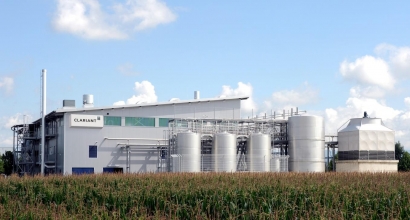
The new partnership expands a previously announced agreement for joint research between ExxonMobil and REG, in which the companies successfully validated the ability of REG Life Sciences bio-conversion technology to convert sugars from cellulosic biomass into biodiesel through a single-step process.
The new agreement with Clariant allows ExxonMobil and REG to further optimize REG’s bio-conversion process using previously tested and benchmarked cellulosic sugars created through Clariant’s sunliquid© process. The companies’ ultimate objective is to combine Clariant’s and REG’s processes into a seamless cellulosic biomass-to-biodiesel technology.
“Over the past three years, our work with REG has led to important advances in genetically improving REG’s proprietary microbes for a beneficial use in facilitating the conversion of cellulosic sugars into biodiesel,” said Vijay Swarup, vice president of research and development at ExxonMobil Research and Engineering Company. “Applying Clariant’s expertise and knowledge will help us better understand and advance a key stage in the overall cellulosic conversion process, and hopefully lead to the development of scalable biodiesel technology.”
Clariant‘s sunliquid process features chemical-free pretreatment, the integrated production of feedstock and process-specific enzymes and thus high yields of fermentable C5 and C6 sugars. Clariant will conduct trials at its pre-commercial plant in Straubing, Germany, using different types of cellulosic feedstock that will be converted into sugars for conversion by REG and ExxonMobil into high-quality, low-carbon biodiesel.
“We are committed to innovation and R&D, together with a focus on sustainability, as main pillars of Clariant’s strategy. Our sunliquid technology platform is a key outcome of this commitment. We are proud that two strong allies in the biofuels industry have selected Clariant as their partner and are excited to work with them on further leveraging this unique technology for converting cellulosic biomass to fuels and chemicals, including biodiesel,” said Christian Kohlpaintner, member of Clariant's executive committee.
REG Life Sciences technology has proven its broad applicability to industries as diverse as flavor and fragrance, specialty chemicals and transportation fuels. Through its partnership with ExxonMobil, REG has developed proprietary technology that utilizes industrial microbes to convert complex cellulosic sugars into low-carbon biodiesel in a one-step fermentation process.
The partners will work on a conceptual engineering study to validate the feasibility of the integrated process comprising the technologies of all parties.
Photo: Clariant’s precommercial plant in Straubing, Germany, where further trials with different types of cellulosic feedstock will be conducted as part of the joint research agreement. (Clariant)

